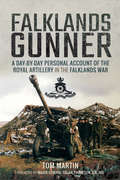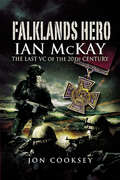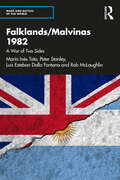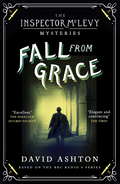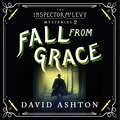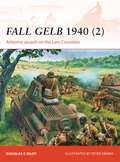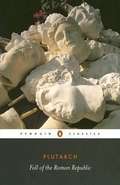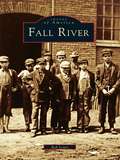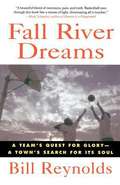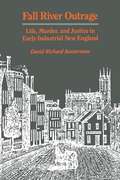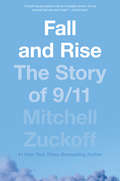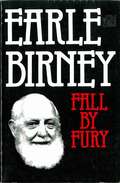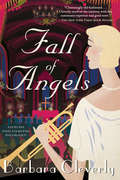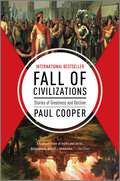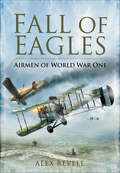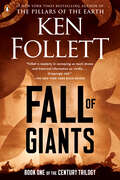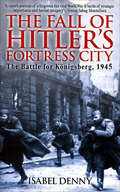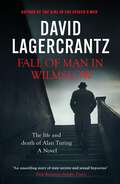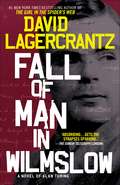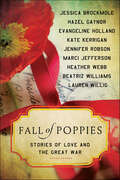- Table View
- List View
Falklands Gunner: A Day-by-Day Personal Account of the Royal Artillery in the Falklands War
by Tom MartinThe Royal Artillery played an absolutely vital, though often forgotten, part in the British armed forces successful operation to recapture the Falkland Islands in 1982. The actions of the artillery were recorded by one young officer in a journal which he kept before, during and after the conflict.Second Lieutenant Tom Martin was a Command Post Officer with 29 (Corunna) Field Battery RA which deployed to the South Atlantic in 1982 as part of the Task Force dispatched to retake the Falklands. With its six 105mm Light Guns making the journey on the MV Europic Ferry, the Battery sailed south on the MV Norland with 2 PARA, joining 3 Commando Brigade for the landings. The five gun batteries of the Royal Artillery, totaling thirty light field guns, fired a tremendous number of shells on the Argentine forces. For its part, 29 (Corunna) Field Battery fired the first Fire Mission of the conflict and continued to do so until the Argentinian surrender in the most testing environment and against the odds.Whilst in the South Atlantic, Martin sought to detail and record the action on the Batterys gun position. Supported by the recollections of some of those he served alongside, Martins notes and diary entries form the basis of this book; a vivid, blow-by-blow account which provides a comprehensive picture of the Royal Artillery and its pivotal role in the Falklands War.
Falklands Hero: Ian McKay–The last VC of the 20th Century
by Jon CookseyAt the height of the bitter battle for Mount Longdon during the Falklands War , 3rd Battalion, Parachute Regiments assault has stalled in the face of determined resistance. With his platoon held up by an Argentine machine gun, it falls to Sergeant Ian McKay to act. The machine gun has to be silenced to break the deadlock. Gathering a small group together, Ian McKay leads them in a headlong dash into the teeth of a withering fire. One by one they fall until only McKay is left, charging on alone towards the Argentine gun and a place in history. His was the final act of a man who lived, breathed and was shaped by the Parachute Regiment: an act which earned him a posthumous Victoria Cross. This is the story of Ian McKay: the last British hero of the Twentieth Century.
Falklands, Jutland And The Bight [Illustrated Edition]
by Commander The Hon. Barry Bingham V.C. R.N.At the outbreak of the First World War, Barry Bingham, an Ulsterman and career sailor who joined the Royal Navy in 1895, was a Lieutenant-Commander gunnery officer on the new battlecruiser HMS Invincible.He and his men did not have to wait long before they were pitched into battle against the German fleet, Invincible was part of the taskforce sent into the South Atlantic to avenge the defeat at the Battle of Corondel. The ensuing battle of the Falkland Islands was a decisive encounter, the lighter German Squadron under Admiral Graf Spee were surprised by their British opponents and lost all but two of their ships.The author's reward for his conduct was command of a destroyer squadron in the Home Fleet and in May 1916 at the Battle of Jutland he was to win the Victoria Cross. He was ordered along with six other destroyers, along with the three of his squadron, to attack Admiral Hipper's battlecruiser squadron. Out-ranged and out-gunned, Bingham's ship drove for his target hard and fast, hoping to come within torpedo range of the heavier German ships. The German destroyer screen intercepted the majority of the British ships, of which two were sunk and others disabled; Bingham in HMS Nestor along with HMS Nicator of his squadron plowed forward. With reckless bravery the two ships carried on to 3,000 yards but were disabled before they could release their torpedoes; the Nestor continued to fight the unequal battle until sunk., Bingham and many of his crew were picked up a German destroyer bound for captivity warmed only by the thought that they had done more than their duty.
Falklands/Malvinas 1982: A War of Two Sides (Wars and Battles of the World)
by María Inés Tato Peter Stanley Rob Mclaughlin Luis Esteban Dalla FontanaAfter four decades from the 1982 war between Britain and Argentina over possession of the Falklands/Malvinas islands in the South Atlantic Ocean, this book allows for a new and rounded reading of the causes, course and consequences of the war. It provides a comprehensive overview of the Falkland/Malvinas War by integrating the military history of the conflict into the diplomatic, political, social and cultural aspects of the war. Including a substantial body of advocacy, chronicle, narrative and analysis, the volume draws upon an extensive range of published sources, in English and Spanish, primary sources from both sides and unpublished testimonies. The book, written by Argentine and Australian historians and scholars, discuss themes such as the background to the war, the offensive campaign for the islands and the English and Argentine experiences and memories of the war from the perspective of the islanders. Being part of the Wars and Battles of the World series, this book will be an essential read for scholars and researchers of military history, British history, Latin American history, defence and strategic studies, geopolitics and modern history.
Fall From Grace
by Larry CollinsCatherine Pradier. Beautiful, sophisticated, dedicated. The most valuable agent the Allies had in France as the D-Day invasion that would decide the future of the world drew near. Hans-Dieter Stromelburg. Elegant, cultured, brilliant. And the superb architect of a diabolically perfect Nazi plan to turn the Allies' supreme undercover weapon against itself. Both knew the stakes in the game they played. But neither could be sure who was betraying whom....
Fall From Grace: An Inspector McLevy Mystery 2
by David AshtonBASED ON THE LONG-RUNNING BBC RADIO 4 McLEVY DRAMA SERIES...WHILE THE STREETS OF LONDON HAD SHERLOCK HOLMES, THE DARK ALLEYS OF EDINBURGH HAD INSPECTOR JAMES McLEVYELEGANT AND CONVINCING' The Times | 'ASHTON IS THE DIRECT HEIR TO ROBERT LOUIS STEVENSON' Brian Cox | 'EXCELLENT' The Sherlock Holmes Society | 'DRIPPING WITH MELODRAMA AND DERRING-DO' HeraldA burglary and murder at the home of Sir Thomas Bouch, the enigmatic architect of the ill-fated Tay Bridge, sets Inspector James McLevy off on a train of brutal killings, lethal liaisons, and double suicide which leads to a violent encounter with an old enemy, Hercules Dunbar.Caught up in a terrifying storm as he tracks his foe to Dundee, McLevy watches the rail bridge collapse and plunge into the icy depths of the Tay. The aftermath brings the destruction of reputation and love as the inspector uncovers the secret passions which have led to murder.THE INSPECTOR MCLEVY SERIES1 - Shadow of the Serpent2 - Fall from Grace3 - A Trick of the Light4 - Nor Will He Sleep
Fall From Grace: An Inspector McLevy Mystery 2 (Inspector McLevy #2)
by David AshtonBASED ON THE LONG-RUNNING BBC RADIO 4 McLEVY DRAMA SERIES...WHILE THE STREETS OF LONDON HAD SHERLOCK HOLMES, THE DARK ALLEYS OF EDINBURGH HAD INSPECTOR JAMES McLEVYELEGANT AND CONVINCING' The Times | 'ASHTON IS THE DIRECT HEIR TO ROBERT LOUIS STEVENSON' Brian Cox | 'EXCELLENT' The Sherlock Holmes Society | 'DRIPPING WITH MELODRAMA AND DERRING-DO' HeraldA burglary and murder at the home of Sir Thomas Bouch, the enigmatic architect of the ill-fated Tay Bridge, sets Inspector James McLevy off on a train of brutal killings, lethal liaisons, and double suicide which leads to a violent encounter with an old enemy, Hercules Dunbar.Caught up in a terrifying storm as he tracks his foe to Dundee, McLevy watches the rail bridge collapse and plunge into the icy depths of the Tay. The aftermath brings the destruction of reputation and love as the inspector uncovers the secret passions which have led to murder.THE INSPECTOR MCLEVY SERIES1 - Shadow of the Serpent2 - Fall from Grace3 - A Trick of the Light4 - Nor Will He Sleep
Fall From Grace: An Inspector McLevy Mystery 2 (Inspector McLevy)
by David AshtonLONDON HAD SHERLOCK HOLMES.THE DARK ALLEYS OF EDINBURGH HAD INSPECTOR McLEVY.'DAVID ASHTON IMPECCABLY EVOKES EDINBURGH' Financial TimesELEGANT AND CONVINCING' The Times'ASHTON IS THE DIRECT HEIR TO ROBERT LOUIS STEVENSON' Brian Cox'EXCELLENT' The Sherlock Holmes Society'A REAL PAGE-TURNER' Sunday Post'DRIPPING WITH MELODRAMA AND DERRING-DO' HeraldA burglary and murder at the home of Sir Thomas Bouch, the enigmatic architect of the ill-fated Tay Bridge, sets Inspector James McLevy off on a train of brutal killings, lethal liaisons, and double suicide which leads to a violent encounter with an old enemy, Hercules Dunbar.Caught up in a terrifying storm as he tracks his foe to Dundee, McLevy watches the rail bridge collapse and plunge into the icy depths of the Tay. The aftermath brings the destruction of reputation and love as the inspector uncovers the secret passions which have led to murder.(P)2016 John Murray Press
Fall From Grace: The Failed Crusade of the Christian Right
by Michael D'AntonioRight-Wing Christianity in the U.S.
Fall Gelb 1940
by Doug DildyThe German blitzkrieg conquest of France and the Low Countries (via the Ardennes, Arras, and Dunkirk) in May and June of 1940 has never been surpassed in the history of warfare in that no clash between such great and apparently equal forces has been decided so swiftly and conclusively. Not deigning to spend itself against the extensive fortifications of France's Maginot Lines, Hitler's Wehrmacht planned to advance its 136 (of 157) divisions through Belgium and northern France in order to destroy the Allied forces there and gain territory from which to prosecute continued combat operations against France and England. Beginning on 10 May 1940, this title follows the fortunes of Heeresgruppe A as its three Panzer Korps moved stealthily through the dark, hilly, and thickly forested Ardennes in southern Belgium before forcing a passage across the river Meuse and racing through France to the Channel in one of the most daring campaigns in history.
Fall Gelb And The German Blitzkrieg Of 1940: Operational Art
by Major Rick S. RichardsonThe objective of this study is to determine if the German "blitzkrieg" and Fall Gelb of 1940 were an expression of operational art. Despite the mythology surrounding Fall Gelb, the campaign does not constitute a major breakthrough in operational art by the Germans. Fall Gelb was not an expression of operational art. This conclusion is based upon an analysis using the approaches posed by U.S. Army and joint doctrine, Dr. James Schneider and Dr. Shimon Naveh.The purpose of this study is to examine more closely what is meant by "operational art" and to use those contemporary insights to re-examine German military operations in France in May 1940, Fall Gelb. Fall Gelb was chosen because it is a campaign that is frequently studied and often used and abused to illustrate various points relating to military operations. The study of the Fall Gelb campaign offers a glimpse of past operations through the lens of contemporary thought. That study provides the contemporary military professional an opportunity to improve his understanding of operational art through the study of a historical campaign.
Fall Of The Roman Republic
by Plutarch Robin Seager Rex WarnerPlutarch has been called the last of the classical Greek historians and the first modern biographer. Above all, Plutarch was a superb dramatic artist and a brilliant popularizer, a writer who has influenced Shakespeare and many other with his vivid studies of the great Greek and Roman leaders. Plutarch's interest is not in historical analysis but rather in character, in the influences of birth and education, in the significance of individual fame and the moral issue this raises. Born in Boeotia in AD 46, he witnessed both the best and the worst aspects of Roman life during the first century AD - the burgeoning of Latin literature, but also the long and bloody foreign and civil wars that marked the collapse of the Republic and ushered in the Empire. Collected here are his lives of the six men who played a central part in those events- Marius and Sulla, Crassus and Cicero, Pompey and Caesar.
Fall River (Images of America)
by Rob LewisThe city known today as Fall River, Massachusetts, considered until 1803 to be a part of Freetown and until 1862 to be partially contained within the boundaries of Rhode Island, came into its own as a great industrial city in the latter half of the nineteenth century. The massive power of the Quequechan River fueled several mills, and Fall River granite provided the basis for a developing stone-cutting business. Over the years, the city's numerous villages have been home to many hard-working and loyal residents. These residents historically have much to be proud of: in many ways Fall River led the region in the development of technology and public education. By the 1880s, the city was equipped with telephones, streetcars, and electrical service, and the B.M.C. Durfee High School-opened in 1886-was considered the finest in the nation. Through the 200-plus photographs and informative captions in this marvelous new visual history, local author Rob Lewis seeks to remind residents of Fall River's glorious past; his work also suggests the future potential of this significant American city as we approach the millennium.
Fall River Dreams: A Team's Quest for Glory - A Town's Search for Its Soul
by Bill ReynoldsIn this deeply felt, unforgettable book, Bill Reynolds journeys with a high school basketball team through the past and present of an American town. Fall River, Massachusetts, is a once-prosperous industrial center haunted by its history, the Durfee High School basketball team begins its annual drive for a state championship: a quest that inspires and sometimes consumes kids, coaches, families, teachers, and all of Fall River. Fall River Dreams is the story of one season's quest-a classic book about sports, youth, time, hope, and memory in American today.
Fall River Outrage
by David Richard KassermanFall River Outrage recounts one of the most sensational and widely reported murder cases in early nineteenth-century America. When, in 1832, a pregnant mill worker was found hanged, the investigation implicated a prominent Methodist minister. Fearing adverse publicity, both the industrialists of Fall River and the New England Conference of the Methodist Episcopal Church engaged in energetic campaigns to obtain a favorable verdict. It was also one of the earliest attempts by American lawyers to prove their client innocent by assassinating the moral character of the female victim. Fall River Outrage provides insight in American social, legal, and labor history as well as women's studies.
Fall and Rise: The Story of 9/11
by Mitchell ZuckoffYears in the making, this spellbinding, heartbreaking, and ultimately uplifting narrative is an unforgettable portrait of 9/11. <P><P>This is a 9/11 book like no other. Masterfully weaving together multiple strands of the events in New York, at the Pentagon, and in Shanksville, Pennsylvania, Fall and Rise is a mesmerizing, minute-by-minute account of that terrible day. <P><P>In the days and months after 9/11, Mitchell Zuckoff, then a reporter for the Boston Globe, wrote about the attacks, the victims, and their families. After further years of meticulous reporting, Zuckoff has filled Fall and Rise with voices of the lost and the saved. <P><P>The result is an utterly gripping book, filled with intimate stories of people most affected by the events of that sunny Tuesday in September: an out-of-work actor stuck in an elevator in the North Tower of the World Trade Center; the heroes aboard Flight 93 deciding to take action; a veteran trapped in the inferno in the Pentagon; the fire chief among the first on the scene in sleepy Shanksville; a team of firefighters racing to save an injured woman and themselves; and the men, women, and children flying across country to see loved ones or for work who suddenly faced terrorists bent on murder. <P><P>Fall and Rise will open new avenues of understanding for everyone who thinks they know the story of 9/11, bringing to life—and in some cases, bringing back to life—the extraordinary ordinary people who experienced the worst day in modern American history. <P><P>Destined to be a classic, Fall and Rise will move, shock, inspire, and fill hearts with love and admiration for the human spirit as it triumphs in the face of horrifying events. <P><b>A New York Times Bestseller</b>
Fall by Fury
by Earle BirneyEarle Birney’s first collection of new poems in five years – a varied assembly of visual and verbal magic from the creator of such beloved classics as “David,” “Bear on the Delhi Road,” “Billboards Build Freedom of Choice” and others. A man whose name is synonymous with poetry, a writer whose popularity cuts across generations and geographical boundaries, Earle Birney maintains a spirit of perpetual youth in his verse, whether making a poem about being old or being in love, about grief or joy, about the past, the present or the future. In Fall by Fury, he deals with all these themes, employing a broad array of forms, including drawn poems, and achieving moods of serenity, humour, irony, tenderness and hope. Here, from one of our most esteemed poets, is a significant new volume, full of the timeless artistry that has earned him two Governor General’s Awards, a Canada Council Medal and the Lorne Pierce Medal of the Royal Society of Canada.
Fall of Angels (An Inspector Redfyre Mystery #1)
by Barbara CleverlyBarbara Cleverly, bestselling author of the Joe Sandilands series, introduces an ingenious new sleuth who navigates 1920s Cambridge, a European intellectual capital on the cusp of dramatic change.England 1923: Detective Inspector John Redfyre is a godsend to the Cambridge CID. The ancient university city is at war with itself: town versus gown, male versus female, press versus the police force and everyone versus the undergraduates. Redfyre, young, handsome and capable, is a survivor of the Great War. Born and raised among the city’s colleges, he has access to the educated élite who run these institutions, a society previously deemed impenetrable by local law enforcement. When Redfyre’s Aunt Hetty hands him a front-row ticket to the year’s St. Barnabas College Christmas concert, he is looking forward to a right merrie yuletide noyse from a trumpet soloist, accompanied by the organ. He is intrigued to find that the trumpet player is—scandalously—a young woman. And Juno Proudfoot is a beautiful and talented one at that. Such choice of a performer is unacceptable in conservative academic circles. Redfyre finds himself anxious throughout a performance in which Juno charms and captivates her audience, and his unease proves well founded when she tumbles headlong down a staircase after curtainfall. He finds evidence that someone carefully planned her death. Has her showing provoked a dangerous, vengeful woman-hater to take action? When more Cambridge women are murdered, Redfyre realizes that some of his dearest friends and his family may become targets, and—equally alarmingly—that the killer might be within his own close circle.
Fall of Civilizations: Stories of Greatness and Decline
by Paul Cooper"A treasure trove of myths and terror… Atmospheric as hell… Immersive."?The TimesBased on the podcast with over one hundred million downloads, Fall of Civilizations brilliantly explores how a range of ancient societies rose to power and sophistication, and how they tipped over into collapse.Across the centuries, we journey from the great empires of Mesopotamia to those of Khmer and Vijayanagara in Asia and Songhai in West Africa; from Byzantium to the Maya, Inca and Aztecs of Central America; from Roman Britain to Rapa Nui. With meticulous research, breathtaking insight and dazzling, empathic storytelling, historian and novelist Paul Cooper evokes the majesty and jeopardy of these ancient civilizations, and asks what it might have felt like for a person alive at the time to witness the end of their world.
Fall of Eagles: Airmen of World War One
by Alex RevellThe Great War of 1914–1918 saw the rapid development of the airplane as a weapon of war. Initially its role was seen as that of reconnaissance, an extension of the cavalry, but as the war stagnated into static trench warfare, with each side facing each other across No Mans Land, the use of artillery, both in shelling enemy positions and counter-shelling his artillery, also became of prime importance. With the early development of radio communication between ground and air, airplanes also undertook the task of spotting for the artillery, and it soon became apparent that these airplanes both the reconnaissance machines and those working for the artillery could not be allowed to work unmolested, and fast fighter airplanes—both single and two seat began to make their appearance over the Western Front. Technical development was rapid. The mostly unarmed reconnaissance airplanes, and the early fighters of 1915 and 1916, armed with a single machine gun, had given way to fighters carrying two guns, flying at altitudes of over 16,000 feet and at treble the speed of the predecessors of 1914. With these developments a new type of soldier had evolved: the fighter pilot. Capable of fighting in the air, in three dimensions and at great speed, individual pilots began to emerge whose singular talents and temperament brought them to the forefront of their respective air forces. They became the aces, pilots who had brought down five or more of the enemy. Despite their expertise, few of these aces survived the war. The last combats of some are known and well documented, others are obscure. Some of the pilots in these pages are well-known, others less so, but all shared the common experience of fighting in the air during the war of 1914–1918: the conflict which saw the airplane evolve from a relatively fragile, unarmed reconnaissance machine, to a deadly weapon that changed the face of war for ever.
Fall of Giants: Book One of the Century Trilogy (The Century Trilogy #1)
by Ken FollettKen Follett's magnificent new historical epic begins, as five interrelated families move through the momentous dramas of the First World War, the Russian Revolution, and the struggle for women's suffrage. A thirteen-year-old Welsh boy enters a man's world in the mining pits....An American law student rejected in love finds a surprising new career in Woodrow Wilson's White House.... A housekeeper for the aristocratic Fitzherberts takes a fateful step above her station, while Lady Maud Fitzherbert herself crosses deep into forbidden territory when she falls in love with a German spy....And two orphaned Russian brothers embark on radically different paths when their plan to emigrate to America falls afoul of war, conscription, and revolution. From the dirt and danger of a coal mine to the glittering chandeliers of a palace, from the corridors of power to the bedrooms of the mighty, Fall of Giants takes us into the inextricably entangled fates of five families--and into a century that we thought we knew, but that now will never seem the same again....
Fall of Hitler's Fortress City: The Battle for Knigsberg 1945
by Isabel Denny“A superb portrait of a forgotten but vital World War II battle of strategic importance and bestial savagery” (Simon Sebag Montefiore, New York Times–bestselling author of The Romanovs)Through firsthand accounts, as well as archival material, The Fall of Hitler’s Fortress City tells the dramatic story of the place and people that bore the brunt of Russia’s vengeance against the Nazi regime.In 1945, in the face of the advancing Red Army, two and a half million people were forced out of Germany’s most easterly province, East Prussia, and in particular its capital, Königsberg. Their flight was a direct result of Hitler’s ill-fated decision to invade the Soviet Union in 1941.The Russians launched Operation Bagration in June 1944, to coincide with the D-Day landings. As US and British forces pushed west, the Russians liberated Eastern Europe and made their first attacks on German soil in the autumn of 1944. Königsberg itself was badly damaged by two British air raids at the end of August 1944, and the main offensive against the city by the Red Army began in January 1945. The depleted and poorly armed German army could do little to hold it back, and by the end of January, East Prussia was cut off. The Russians exacted a terrible revenge on the civilian population, who were forced to flee across the freezing Baltic coast in an attempt to escape. On April 9, the city surrendered to the Russians after a four-day onslaught.“Denny fills in a gap in the historiography of World War II’s European eastern front.” —Booklist
Fall of Man in Wilmslow
by David LagercrantzJune 8, 1954. Alan Turing, the visionary mathematician, is found dead at his home in sleepy Wilmslow, dispatched by a poisoned apple. Taking the case, Detective Constable Leonard Corell quickly learns Turing is a convicted homosexual. Confident it's a suicide, he is nonetheless confounded by official secrecy over Turing's war record. What is more, Turing's sexuality appears to be causing alarm among the intelligence services - could he have been blackmailed by Soviet spies? Stumbling across evidence of Turing's genius, and sensing an escape from a narrow life, Corell soon becomes captivated by Turing's brilliant and revolutionary work, and begins to dig deeper. But in the paranoid, febrile atmosphere of the Cold War, loose cannons cannot be tolerated. As his innocent curiosity fast takes him far out of his depth, Corell realises he has much to learn about the dangers of forbidden knowledge.
Fall of Man in Wilmslow: The Death And Life Of Alan Turing
by David LagercrantzFrom the author of the #1 best seller The Girl in the Spider's Web--an electrifying thriller that begins with Alan Turing's suicide and plunges into a post-war Britain of immeasurable repression, conformity and fear June 8, 1954. Several English nationals have defected to the USSR, while a witch hunt for homosexuals rages across Britain. In these circumstances, no one is surprised when a mathematician by the name of Alan Turing is found dead in his home in the sleepy suburb of Wilmslow. It is widely assumed that he has committed suicide, unable to cope with the humiliation of a criminal conviction for gross indecency. But a young detective constable, Leonard Corell, who once dreamed of a career in higher mathematics, suspects greater forces are involved. In the face of opposition from his superiors, he begins to assemble the pieces of a puzzle that lead him to one of the most closely guarded secrets of the war: the Bletchley Park operation to crack the Nazis' Enigma encryption code. Stumbling across evidence of Turing's genius, and sensing an escape from a narrow life, Corell begins to dig deeper. But in the paranoid, febrile atmosphere of the Cold War, loose cannons cannot be tolerated and Corell soon realizes he has much to learn about the dangers of forbidden knowledge.He is also about to be rocked by two startling developments in his own life, one of which will find him targeted as a threat to national security.From the Hardcover edition.
Fall of Poppies: Stories of Love and the Great War
by Heather Webb Jennifer Robson Hazel Gaynor Beatriz WilliamsTop voices in historical fiction deliver an unforgettable collection of short stories set in the aftermath of World War I—featuring bestselling authors such as Hazel Gaynor, Jennifer Robson, Beatriz Williams, and Lauren Willig and edited by Heather Webb.On the eleventh hour of the eleventh day of the eleventh month...November 11, 1918. After four long, dark years of fighting, the Great War ends at last, and the world is forever changed. For soldiers, loved ones, and survivors the years ahead stretch with new promise, even as their hearts are marked by all those who have been lost.As families come back together, lovers reunite, and strangers take solace in each other, everyone has a story to tell.In this moving anthology, nine authors share stories of love, strength, and renewal as hope takes root in a fall of poppies.Featuring:Jessica BrockmoleHazel GaynorEvangeline HollandMarci JeffersonKate KerriganJennifer RobsonBeatriz WilliamsLauren WilligHeather Webb
